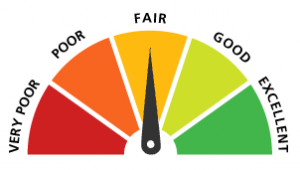Personal Finance
When Is Saying No Better Than Yes?
Published
7 years agoon

“If you had one shot, one opportunity, to seize everything you ever wanted in one moment, would you capture it or just let it slip?”
Most well-known personalities, singers, movies, etc all talk about saying YES when opportunities pop up. Eminem talked in many of his songs about seizing the opportunity, just like the quote above.
There is value to this because most people won’t take advantage of the opportunities they are given. I’m not an avid listener of that genre of music, but Marshall Mathers really strikes into a vein of our society via music in a way that I’m not sure others have done.
The fact is most people let fear stop them from achieving something greater.
But, for those of us with an entrepreneurs mentality, we naturally say yes when opportunities pop up.
“Yes, I’ll buy that property.”
“Sure, I’ll partner on that deal.”
“This is a great business idea to create another stream of income!”
The problem is that almost no one talks about saying no.
As real estate investors or any other business minded person, it’s Often, saying NO is more valuable than saying YES.
It’s Hard to Say No
It’s easy to make excuses but it’s hard to say no. Be honest with yourself, when was the last time a friend asked you to help them move and you said in simple terms “no”?
Maybe you found something else to do that day. Perhaps you were ‘busy’. Whatever it was, you didn’t just say no.
It’s similar with business. Many people find excuses to not be successful, but few say “no” to success.
But, once you start saying “yes”, it’s addicting. More opportunities, more revenue, more income, more potential.
It’s HARD to say no to those things. But, sometimes we need to. Here are a few reasons why.
Think of Opportunity Costs
I recently met up with my good friend Jennifer over at REIMillionaire while we were both in Oklahoma City checking out some opportunities. She is really successful in real estate and has a number of income streams from various sources related to real estate.
We were assessing some solid BRRR Strategy opportunities. I asked her, “So, what do you think about these?”
“The numbers work. I have a few concerns but I think they are solid.”
“So, are you going to do it?” I asked.
“No, I don’t think so…”
After some more conversation, she pointed out that pursuing those deals don’t fit well into what she was doing elsewhere She wanted to focus on syndicating some new-build multifamily near Seattle that we’re working on together as partners.
It’s important to think about opportunity costs when evaluating a potential opportunity, be it in real estate or in other business.
We all have a ‘bandwidth’ meaning we can only focus on a certain number of things in a given period of time. When you take on a new opportunity, it will take you away from other things that you are working on.
And that is opportunity cost – what you give up in order to get something else.
As entrepreneurs, this is so hard to determine!

It’s Hard to Estimate Opportunity Costs
Think about it, imagine you’re earning money on your real estate, as an agent, with your website, doing some wholesaling. You’ve got a lot of revenue coming in.
Then, someone asks you to partner on a new build, or to start a property management company, or to do…whatever else.
So, you take the opportunity. You can make money doing it for sure.
You also don’t lose any money in your other areas. You’re still earning the same amount, so it’s good, right?
The hard part is going back and assessing if you could have earned even more if you had spent that time building up one of your other revenue streams.
Chances are if you had dedicated the same amount of time to buying more rentals, building your agent business, wholesaling real estate, or whatever else it is you do, you could have earned more.
Say No If You’re Too Excited
One of the problems investors run into is the excitement about a deal. It’s more common in newer investors but it happens with experienced investors as well.
If you find yourself overly excited about something, you might be trying to convince yourself to do it. If this is happening, it’s time to take a step back and take a deeper look.
When you’re evaluating any potential investment, regardless if it’s business, stocks, or real estate, you need to be totally detached. If you catch yourself fudging numbers to make it work, you’re probably too excited.
I’ve done it before tons of times. In real estate, you’ll find yourself bumping rents a little bit or dropping expenses in some way trying to get the numbers to pan out.
Remember, it’s always cheaper to lose a good deal than to say yes to a bad deal! So, it might just be time to walk away if you’re doing this.
Focus on a Few Things
The moral of the story is to focus on just a few things. Don’t get distracted by shiny objects and don’t chase things just because they could earn money.
When you are looking to chase a new project, be skeptical and avoid it if you find yourself getting too attached to it.
What about you, have you ever had to say no to a new project or investment even if it was a good one?
This article originally appeared on IdealREI. Follow them on Facebook, Instagram and Twitter.
You may like
Personal Finance
DIY: Money Management Tips That Will Improve Your Finances
Published
4 years agoon
January 11, 2022
Even if you’re not looking for a property this exact second, you always want to be improving your position.
So, focus on the downtime to improve your finances, get your debt squared away, and put yourself in a better position when you are ready to buy!
It’s important to be sure of your financial position before you buy a property because you might find it’s harder to get that property than you would have originally thought.
Here are some personal finance tips to help you save, pay down more debt, and qualify for better loans.
Pay Attention
One of the most common reasons that people struggle financially is because they simply don’t pay attention to what is going on in their own financial life. If you are not paying attention, you can’t hope to know what is going on and therefore know how to improve matters.
Read these money management tips to start paying attention to your finances.

When I’m working on a project, I’m laser-focused on the budget, the details, the costs, etc. But, sometimes in my personal life, I let this slide.
The reality is, when we do have a budget and focus on sticking to it, our bank account balances grow so much faster than when we aren’t using one.
I love to eat out, and my wife loves to buy small things around the house. One day, we looked back over the previous year of spending and found we each averaged over $1,000 per month on our hobbies!
By pulling back a little in each area, we were able to save over $1,000 per month but still do the things we enjoyed.
So, start by having a budget!
Even if you are financially well off and can afford most of what you want, by budgeting for the items and spreading the costs out over several months, you’ll find that you buy less, spend less, and save more.

Also, if you budget to pay down certain debts faster, you’ll see those balances dramatically drop!
So, do not overlook the importance of a family budget.
Save On Other Purchases
There might be a number of other big purchases you need to make before you get hold of your next property, and it is a good idea to make sure that you are only spending as much on those as absolutely necessary.
For any big ticket items, we actually start searching for them months or even a year in advance. For example, let’s consider kitchen appliances.
As you know, a full set of appliances can easily cost $5,000-$10,000 if you are getting high-end products. It includes a fridge, double oven, gas cooktop, microwave/fan, and dishwasher.
The first thing we did was go to the store and decide on two or three brands, styles and product lines we wanted. It’s hard to compare prices unless you are looking at similar products between stores.
Then, for months we’ll watch these items and their prices. Occasionally there will be sales and by tracking the pricing all year, we know which sales are worth getting or not. When we feel we are getting the best price, we’ll buy.
And by doing that, we can easily save $500-$1,000 or even more.
We did something similar with our TV, computer monitors, etc. Basically, anything that is currently working that we want to upgrade. Over the course of a year, we are saving thousands of dollars.
You might also use a money saving app to help.
Saving money in all these places will make an enormous difference when it comes to saving for your next down-payment
Pay Down Debt
With all the money you are saving by budgeting and by planning out major purchases, you might want to use some of it to pay down debt.
You’ll have to decide if it’s better to pay down debt or have a larger down payment because both will hold you back on your next purchase.

But, generally, paying down $1/month in debt is worth about $3/month in income. At least, as far as loans are concerned.
If you do decide to work on paying down your debt, I fully detail a unique debt pay down method to get you into your next rental property faster.
Increase Your Income
Most people just focus on debt, but the reality is you can only cut your expenses so much.
Income, on the other hand, has unlimited potential. So, why not focus on growing your income?
Increasing your monthly income can be done in a number of passive and active ways, and it is worth looking into as many of these as you can to find the right one for you. I outline a number of ways to increase your income in this article on how to earn $10,000 per month.
While earning $10,000 per month in side-income might seem a long way off, it’s important to start! Even if you can earn an extra $500 month now, and grow it slowly over time, it’s worth it!.
Don’t Focus on Just One Thing
As I mentioned already, focusing on just budgeting, or debt paydown can be detrimental to your overall financial goals. It’s important to combine a number of different things into an overall strategy, which includes budgeting, debt paydown, and increasing your income.
To know more about real estate hack, money tips, and building generational wealth, subscribe to Wealthlab and learn how to bust through the barriers preventing you from becoming a millionaire.
This article originally appeared on IdealREI. Follow them on Facebook, Instagram and Twitter.
Personal Finance
VIDEO: 3 Things You MUST Know About Your Credit Score
Published
4 years agoon
October 18, 2021
We all know what a credit score is. Sort of. But what really goes into your credit score? In this video, Investopedia breaks it down. Here are the top 3 factors that affect your credit score — and what you can do about it.

If financial difficulties are keeping you awake at night, take action and tackle your problems head on otherwise they are likely to get worse. The ability to pay for rent, mortgages, bills, and food are fundamental to our quality of life.
It is important to plan for future financial hardship by making saving a goal and budgeting carefully. It’s impossible to predict what will happen in the future, so to cushion any financial hardship, it’s worth putting a little money aside each month.
Developing a savings plan now will enable you to get on with living your life stress-free! Here are the financial tips to start building your wealth.
Reduce monthly bills
List all your current outgoings and look to see if you can make any savings. Often it’s tempting to keep the same standing order from the same insurance company for year upon year. You are likely to be paying too much for your premiums and it’s worth shopping around and switching.
Look at the amount of interest you are paying on loans, mortgages and credit cards, you could be able to secure a better deal. One thing to remember is to check your credit score if it is poor lenders won’t give you the best interest rate.

It is possible to repair your credit score by using the expertise of a credit repair company.
Utility bills can be reduced by switching utility providers. Use an online comparison site to secure the best deal. Switching is easy as most of the work is completed for you by your new supplier.
Budget
To budget carefully you need to be in control of your spending and to be in control you need to be aware of your income and outgoings. List every necessary outgoing that must be met on a monthly basis and you will be left with an amount which will have been spent on miscellaneous items such as eating out.
You can then design a budget plan so that you can put a certain amount into a savings account. You will probably be surprised at how much your morning coffee costs when added up over the month.
Cut it down to once or twice a week and you will make significant savings.
Make savings work to your advantage
Savings (if you have them!) can work to your financial advantage. Ensure you choose the best financial products that give the maximum return on your savings. Financial products change rapidly to factor in a financial audit of your savings every couple of years to check savings are in the best account.
You could also consider investing your savings property or financial shares. This has the potential to be lucrative but is not without risk. Consider hiring a professional and independent financial advisor for advice.

Ideally, you should set apart some of your salaries each month in order to build up an emergency fund. Life can be unpredictable and without savings to fall back on, your car breaking down or your roof leaking could plunge you into more debt as you borrow to rectify the situation.
Savings will cushion the blow of any financial hardship.
Stop Paying Extra Bank or Late Fees
Late fees are not helping you. They add up over time – fees can even accrue fees!
If you are the kind of person who always forgets to pay their bills on time, you can get around this by automating your finances so that the money automatically goes out of your account.
You should also avoid making any extra charges on your credit card unless you are sure that you are able to pay it off in full at the end of the month.
Don’t Pay Full Price!
Paying full price is a really common financial mistake that a ton of people make.
In today’s world, you can find a sale on just about any item. If you see something you need at the store, take a few moments to shop for it online and you’ll probably be able to save 10-20%
Not only does this method stop you from overpaying, it also gives you a moment to think and decide whether or not what you were thinking of buying is actually a worthwhile investment.
Create a Financial Defense Plan
All of us need to not only earn our living and grow our finances if we’re to live a comfortable and happy life, but we must also defend them.
That means ensuring you stay rational, sensible and forward-thinking in all matters related to your financial health.
There are a few considerations you can take care of in order to make this so, and generate a cognitive and systemic financial defense to keep your money yours, and flowing in the direction you most want.
Here are the keys to defending your financial interests
Know Good Lawyers
The most important thing is to have good counsel and good advice. So, hire the best attorneys that you can afford. From real estate to contracts to brand protection, you need someone behind you making sure you aren’t making any major missteps.
The world practically runs in the courtroom now, unfortunately. So, with good attorneys on your side, it will keep you out of the courtroom and focused on running your business.
Have A Contingency Plan
It’s always best to have a fail-safe.
This might mean never tying up all your investments in one basket. It might mean diversifying your investments .
Or, it could mean allowing only one or two financial handlers to have any kind of insight into your money matters in the first place.

The key is to be able to have a solid plan but also be able to pivot to something else should the first plan fail.
With the willingness to keep a backup plan, or a mode of operation to take when something fails or doesn’t go the way you expect, you at least won’t lose anything.
Keeping a solid contingency is also reliant on keeping solid discipline with your financial means – without this none of your decisions are likely to land effectively.
Pore Over Contracts
Whenever signing a contract, or forging a new one, you need to know exactly what terms are referring to.
You also need to read between the lines, and consider what situations a certain stipulation could affect in the future. Remember, even vaguely written terms in a contract do not fall there unexpectedly.
They are either there to make or defend a certain form of income, or persuade and dissuade a certain type of behavior. Every word counts.
Remember the first recommendation? Well, here’s where they come in. But, it’s important to know how to read and interpret the contracts yourself as well.
Study contract terminology and simply dedicate the time to observe and understand.
Look For Weak Spots
What are the weak spots in your defense system?
Could it be family members having access to your accounts? Do you think it could it be emotional family members asking for financial help, when this is not genuine?
Or perhaps it could it be the services you bank with.
Don’t forget about the way you log in to your accounts and store passwords.
To prevent your finances from being breached, keep up to date on modern security measures. From there, you should be settled.
Conclusion
To reduce your financial stress, the key is to lower your costs, increase your passive income, and protect your assets.
To know more about real estate hack, money tips, and building generational wealth, subscribe to Wealthlab and learn how to bust through the barriers preventing you from becoming a millionaire.
This article originally appeared on IdealREI. Follow them on Facebook, Instagram and Twitter.
Top 5 Best Investment Strategies To Survive A Recession
The Top 10 Investment Opportunities To Capitalize On During A Recession
3 Gold Mining Stocks To Buy Today 📲
Ad 1
Trending

You’ve reached your free article limit.
Continue reading by subscribing.
Already a subsciber? Login >
Go back to Homepage >






